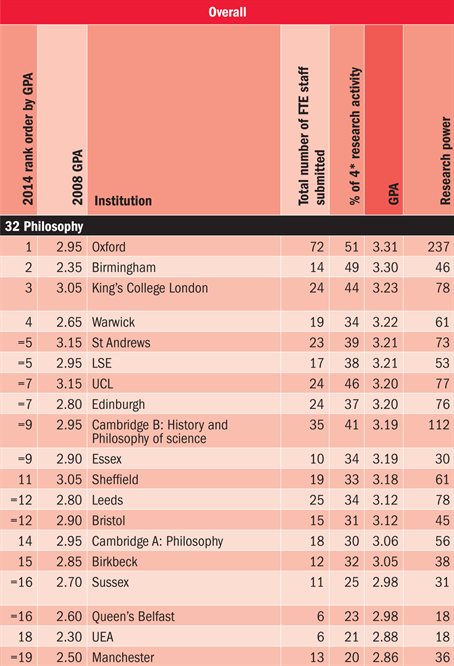Philosophy 3rd in the UK in the REF
The Department of Philosophy has announced that it has been ranked 3rd in the UK for both quality and power according to the Research Excellence Framework (REF) rankings (and also 3rd in the Times Higher Education REF rankings). The power rankings indicate the quality and quantity of research activity while the REF assesses the quality of research taking place between 2008 and 2013 in UK higher education institutions. 80% of research was valued as being of a world-leading (4*) or internationally excellent (3*) standard and 63% of its research scored the top rating for impact with an outstanding reach and significance.

(Source: Times Higher Education)
Philosophy entered 26 staff including four early career staff and 96 outputs. The Department of Philosophy is one of the largest in the country with particular strengths in history of philosophy, philosophy of mind and psychology, philosophy of language and linguistics, metaphysics, epistemology and philosophy of science and moral and political philosophy.
Since the last Research Assessment Exercise (RAE), where the Department’s research strategy was praised, it has reinforced its strengths and expanded further into the philosophy of medicine, philosophy of science and political philosophy. Key steps towards this goal were the award of a £1.95 million grant in 2009 from the Wellcome Trust to establish the King’s Centre for Humanities and Health as well as a £1.4 million donation from the Sowerby Foundation to fund a Chair in Philosophy and Medicine in 2013.
Professor Maria-Rosa Antognazza, Head of the Department of Philosophy, said: ‘These excellent results confirm our track-record as a world-class leader in central areas of philosophy, as well as an innovative player in ground-breaking fields at the intersection between philosophy, psychology, neuroscience, physics, medicine, politics and linguistics. Our impact has demonstrated both reach and significance, enriching the lives of thousands of people who have benefitted from our history of philosophy podcasts, enhancing the cultural heritage through our Ancient Commentators project, inspiring the work of medical practitioners, and guiding policy makers in their understanding of human rights.’
A new element of the REF was the requirement for higher education institutions to demonstrate the impact their research was having on the economy, society, culture, public policy, services, health or environment, beyond academia. The Department has worked with medical practitioners to shape the understanding of fundamental concepts such as health, disease, body, mind and identity and their underpinning of the methods and ethics of the medical profession. Members of the Department have informed and enriched public understanding of standards of human rights, well-being and equality through their work with policy makers.
Academics in the Department have been proactive at engaging with the media in order to reach a broader public, giving interviews on TV, national and local radio including BBC News and BBC Radio 4 as well as in print articles in the Independent, Prospect, the Observer and the Guardian. The Department has also provided academic mentoring in schools, given talks for the general public and offered free of charge resources.
One such resource is the History of Philosophy Without Any Gaps podcast series which aims to make one of the Department’s key research strengths accessible both intellectually and practically to the general public. Since its launch in 2010, more than 400,000 people have visited the podcast website and in 2012 the podcast surpassed three million downloads.
Another example of the Department’s reach is the work of Professor Raimond Gaita, whose work has shaped and changed the understanding of core moral and political issues of the general public in Australia and beyond and has influenced the attitudes of policy makers and lawyers. His book, Romulus, My Father, which uses biography to meditate on the human condition, has reached and influenced vast numbers of people and was adapted into a film of the same title internationally released in 2007 and 2008. His books are also on the reading list for the Higher School Certificate in Australia and have, therefore, had an immediate impact on the moral sensitivities of thousands of young Australians.